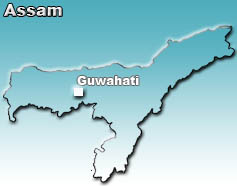Asian rights body''s five steps to end systemic failures in India
 Guwahati, Dec. 9 : India is making the same mistakes in handling its internal conflicts as it did in tackling the external attacks on Mumbai.
Guwahati, Dec. 9 : India is making the same mistakes in handling its internal conflicts as it did in tackling the external attacks on Mumbai.
This is one of the findings of the Asian Council of Human Right''s in its India Human Rights Report 2008.
The report underlines that human rights violations by the State, combined with the failure of State institutions to address these violations, are fuelling internal conflict.
If this was not bad enough the report exposes the extraordinary low level of state and non-state monitoring of human rights violations in India.
Both failures can be attributed to a mixture of State inaction and in some cases deliberate policy.
Similar mistakes that led to the external attack on Mumbai can be seen in India''s approach to internal conflict. Limited and poor quality human rights information is failing to provide the right information to decision makers to prevent further internal conflict.
According to the report, what is more worrying is that decision makers are failing to act even when the information is provided.
Presently 21 States (13 Naxalite affected, 7 North Eastern States and Jammu Kashmir) out of 28 States are afflicted by conflict and human rights violations by the State agencies are further fuelling the conflicts.
Citing official cover up, the ACHR states that the government has not brought any of the reports of the National Commissions for Scheduled Tribes and Scheduled Castes before the parliament since 2002.
The Adivasis and Dalits mainly inhabit the Naxalite affected areas. Parliamentarians are being kept in the dark by the bureaucracy.
It says official statistics of human rights violations are inaccurate. Despite routine extra-judicial executions in encounters, the National Human Rights Commission recorded only one case of encounter killing in Jammu and Kashmir during 2006-2007, while none has been recorded with regard to Manipur and Chhattisgarh - the most intensive conflict States in India.
Despite the army and the paramilitary forces being responsible for gross human rights violations in conflict situations, there are no official crime statistics involving the Army in tackling insurgency as the National Crime Records Bureau of the Ministry of Home Affairs does for the police.
The Asian Centre for Human Rights report states that armed opposition groups across India have been responsible for gross violations of international humanitarian law including killing, abduction and mutilation.
"Among the armed opposition groups in the country, the armed groups in Assam were the worst violators of international humanitarian laws, including targeted killings of at least 49 Bihari labourers and killings of many political leaders like Purnendu Langthasa and Nilendu Langthasa in the North Cachar Hills," states Subhas Chakma, chairperson of the ACHR.
The crimes committed by the armed groups are international crimes but the governments have failed to establish accountability. Among the States, Uttar Pradesh has the worst human rights record with 66 percent of the fake encounter killings (201 complaints out of the 301 complaints), 241 cases of death in judicial custody and maximum number of custodial rape (2) in 2006-2007.
Uttar Pradesh reported the highest number of crimes against the Scheduled Castes with 6,114 cases out of the total of 30,031 during 2007, an increase of 23.8 percent over
2006 (4,960 cases).
Maharashtra has the worst record of deaths in police custody with almost two custodial deaths in each month.
"Political repression is most serious in West Bengal, Kerala and Tripura. It is impossible to make a distinction between the Party authorities and State authorities and between law enforcement personnel and the CPM cadres. The State sponsored violence in Nandigram exemplifies the problem,” states Chakma.
While Madhya Pradesh tops the list with 1,501 cases out of the total of 5,532 crimes against the Scheduled Tribes, representing 27.1 percent of the total national total during
2007, the Asian Centre for Human Rights lamented the unofficial instructions of the West Bengal government to the police not to register cases under the Scheduled Castes and Scheduled Tribes (Prevention of Atrocities) Act.
The registration of only five incidents in 2007 by West Bengal has not stopped the Maoists from gaining support in the tribal belt of the State.
Orissa is the most insecure State for the Christian minorities in the country. Since December 2007, violence against the Christians has continued unabated but the State government has failed to take appropriate measures to bring the accused to justice.
The appalling terror attacks in Mumbai have revealed atrocious failures in intelligence gathering and/or failure to act on intelligence. India also faces an internal security challenge. India Human Rights Report 2008 demonstrates that respect for human rights are an essential part of that fight.
Human rights violations are the early warning of conflicts ahead, Chakma said.
In order to address the current systemic failures, the Asian Centre for Human Rights recommended that (1) A revision of crime statistics collection, including all branches of the security forces; (2) compilation of statistics by NHRC in conformity with international human rights practices, (3) Increased support to the Judiciary and Quasi Judicial Institutions; (4) the establishment of State branches of all National Human Rights Institutions in all States of India with independence, adequate powers and resources; and (5) an immediate removal of the Foreign Contribution Regulation Act. (ANI)